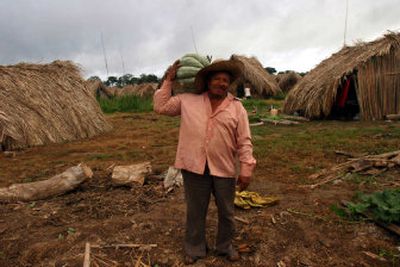Bolivia’s president takes first step in land reform

PUEBLOS UNIDOS, Bolivia – Land reform has long been the battle cry of Latin American leftists, not least in Bolivia, where President Evo Morales wants to convert nearly a fifth of the country into communal farms. His revolution has begun here, on a remote riverbank, with a few dozen thatched huts, two Chinese tractors and plenty of hope.
The hamlet of Pueblos Unidos, or “People United,” is the first community founded on land redistributed by Morales, and represents a crucial first step in the populist leader’s vision of lifting his fellow Bolivians out of South America’s severest poverty.
But the village and its mosquito-choked fields also reveals the immense challenges facing the farmers, from competing with the giant soybean plantations next door to coming up with gasoline for the tractors.
Still, the community founded in September is a dream come true for several hundred formerly landless peasants – a 40,000-acre spread, part of which lies on land expropriated from a soybean farmer.
“We’re no longer talking about whether we can stay here or not, whether the legal papers might come through, whether it’s time to move again,” said Luis Velasquez, a leader in Bolivia’s Landless Movement and Pueblo Unidos’ unofficial mayor. “We’re talking about something real.”
Elected a year ago as Bolivia’s first Indian president, Morales has pledged to redistribute a staggering 77,000 square miles – an area the size of Nebraska – among Bolivia’s long-oppressed Indian majority over the next five years.
To meet that goal, Morales plans to hand out titles to government land and expropriate private acreage deemed unproductive or fraudulently obtained.
But land titles are in a muddle dating back centuries, despite 10 years of efforts by previous governments to sort them out. Morales’ government must untangle them while building a government agency to monitor land use across a sparsely populated nation twice the size of France.
Ultimately, success will turn on how well his government can support the farmers settling the redistributed land.
Morales came to Pueblos Unidos in October to donate the tractors, a gas-powered generator and pump for the well. But in December, the tractors and the generator had no fuel, and sat idle in a clearing of dried mud at the village center.
“We have to make this a national effort,” said Miguel Urioste, director of Fundacion Tierra, a La Paz-based nonprofit group monitoring agrarian reform in Bolivia. “We have to work together to provide technical support, training, schools, safe drinking water. Just handing out tractors won’t get it done.”
Without such help, Bolivia risks repeating the history of its original land reform, sparked by a 1952 revolution in which poor Aymara and Quechua Indians in the Andean highlands seized the haciendas on which they worked from their European-descended owners.
A law divvied up the haciendas into small farms the following year. But over the next decades a lack of government support doomed many of them.
The 1952 revolution hardly touched eastern Bolivia, where Santa Cruz was then a small, remote city without a highway connecting it to the capital of La Paz, 340 miles to the west.
In the years since, waves of immigrants chased booms in sugar cane, cotton and soy, scraping the countryside around Santa Cruz clear of jungle and setting up the large farms now central to Bolivia’s economy.
Santa Cruz’s frontier capitalists are deeply suspicious of Morales’ new brand of Andean socialism, and a widely circulated government list naming some of Bolivia’s largest landowners – many with strong ties to the conservative opposition – has only stoked their fears.
For now, no one can be sure whose land – and how much land – Morales’ reforms will affect.
“The people here say, who is our god? Our god is Evo, because the other one has never given us anything. It’s Evo you have to ask for things, they say. Send your prayers to him,” said villager Fernando Mendoza, 53.
“There are so many people with nowhere to go, with nowhere to work. And Evo, he remembers that.”